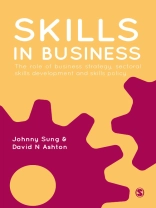Johnny Sung and David Ashton are two of the leading scholars in the area of skills. This book combines challenging theories with cutting edge research in a way that should bring skills to life for students. I strongly recommend it for anyone researching or studying in this area.
– Irena Grugulis, Leeds University Business School
‘A much needed contribution to the complex debate of how skills can best be utilised to enhance company performance, with particular emphasis on an innovative sectoral approach. It is a model of clarity in its presentation of the authors’ conceptual models using a historical narrative as well as comparative case studies in both the UK and Singapore.’
– Bert Clough, Leeds University Business School
Public skills policy in most market economies in the last forty years made one repeated error, time and again. We seem to be unable to learn from those mistakes. Consistently, public policies view a wide range of economic and social issues e.g. low productivity, low-skilled jobs, low wage, inequality and in-work poverty as the consequence of skills deficits and a lack of qualifications held by individual workers. Whilst mis-diagnosing the source of the problems and failing to deliver any effective change, public skills policies continue with a policy prescription of ‘more skills’ and ‘more degrees’. If we have not solved the problems with this decade-old approach, why should the same medicine work this time?
This book examines the role of public skills policy from a completely different perspective. It starts by challenging the lack of a systematic analysis of the link between skills utilisation and business strategy, and provides a new model for fresh thinking. The book extends this theoretical analysis to examine the implications for the sectoral approach to skills development as a more effective form of public skills policy.
David N. Ashton is Emeritus Professor at the University of Leicester and Honorary Professor at Cardiff University.
Johnny Sung is at The Institute for Adult Learning, Singapore Workforce Development Agency, Singapore.
表中的内容
Introduction
The Challenges Facing Skills Policy in the 21st Century
The Long Wait is Over: Linking Business Strategy to Skills
Technical Relations and Skill Levels
Interpersonal Relations and Skill Utilisation
Skills, Performance and Change
A Sectoral Approach to Skills Development and Public Skills Policy
Conclusion
关于作者
David Ashton is an Emeritus Professor in Management at Leicester University and Honorary Professor at Cardiff University. He has also taught at the University of Reading in the UK, the University of Alberta (Canada) and the State University of New York at Buffalo (USA).












